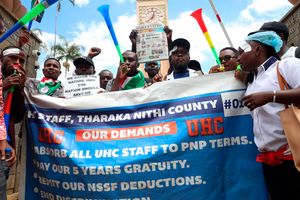Trained but jobless: How Kenya wastes its skilled medical graduates despite shortage

Trained medics finding alternatives for survival (from left) Collins Ouma, Samson Kamande and Elizabeth Kajuju.
What you need to know:
- The government spends millions educating healthcare workers, yet fails to deploy them where they are desperately needed, leaving them abandoned while health facilities continue to operate with skeleton staff.
- Out of the 5,352 doctors registered during that four-year period, only around 1,000 have been employed, with the rest joining the ever-growing list of unemployed graduates. The union is yet to compile data for the current years.
While a number of facilities and counties are experiencing shortages, with healthcare workers reporting burnout, thousands of qualified healthcare professionals are now selling fruits on street corners, operating machinery in factories, or filling in university questionnaires - just to survive.
The government spends millions educating healthcare workers, yet fails to deploy them where they are desperately needed, leaving them abandoned while health facilities continue to operate with skeleton staff.
Kenya is estimated to release at least 1,000 doctors into the job market each year. According to the Kenya Medical Practitioners, Pharmacists and Dentists Union (KMPDU), approximately 955 doctors joined the profession in 2021, 1,321 in 2020, 767 in 2019, and 979 in 2018.
Out of the 5,352 doctors registered during that four-year period, only around 1,000 have been employed, with the rest joining the ever-growing list of unemployed graduates. The union is yet to compile data for the current years.
According to the 2025 State of the World’s Nursing Report by the World Health Organization and the International Council of Nurses, Kenya now has 125,499 registered nurses - up from just 40,000 in 2013. This represents an increase of 85,499 nurses over twelve years, with the country graduating an average of 7,125 nurses annually.
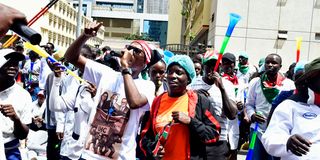
Universal Health Coverage (UHC) workers protest outside the National Treasury Building in Nairobi on May 27, 2025.
Some of the medical graduates have shared their personal stories:
Samson Kamande
I'm 25 years old with a Bachelor's Degree in Nursing from South Eastern Kenya University. But instead of working in a hospital, you'll find me selling fruits and green peas on the streets of Dagoretti Corner, waiting for a government internship that will never come.
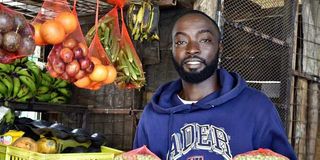
Samson Kamande, a nurse, sells fruits in Dagoreti Corner.
I was born in Kambogo, a small village in Kigumo Sub-County, Murang'a County. In our family of seven, I'm the lastborn. My parents, had little money but endless faith that education could change our lives.
My mother worked in neighbours' gardens for daily wages while my father hustled in Nairobi, both believing we would make them proud someday. Despite walking long distances to school, sometimes barefoot, all of us made it through.
Also Read: The silent grief of Kenyan nurses
At Gakarati Primary School, I scored good grades and dreamed of becoming a doctor. But my KCSE grade of B meant nursing school instead of medicine. My mother celebrated like I had already become a doctor when I got university admission.
Campus was challenging, but I graduated. On paper, I'm a qualified nurse. In reality, I'm unemployed.
After graduation, I went to Narok and worked in construction for three months, living out every meme about foremen and casual labourers. I saved a few thousand shillings and moved to Nairobi, hoping for better opportunities.
A friend - an unemployed teacher - introduced me to street hawking. That was almost a year ago.
People often ask why I don’t work in private hospitals. The answer is simple: I only have academic certificates. Without a government internship placement, I cannot obtain a nursing licence.
No licence means no job, anywhere. I'm one of 2,500 graduates waiting for placement letters that never come.
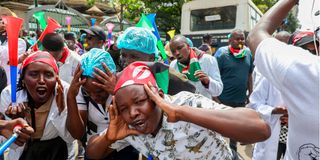
Universal Health Coverage medics protest along Harambe Avenue Nairobi on May 27, 2025 to demand better terms of employment.
My day begins at 4am. I board a matatu from Thika to Highridge Market in Nairobi’s Parklands for fruits, apples, grapes, oranges. Then to Marikiti Market for vegetables and groceries. By 10am, I'm set up at Dagoretti Corner.
I've learned to smile at strangers, to bargain, to sell, skills I never thought I'd need as a nurse. The same hands trained to take blood pressure and give injections now weigh fruits and pack vegetables.
It's not just me. Hundreds, perhaps thousands of young medical professionals are sitting idle while Kenya's healthcare system is overwhelmed. We should be in hospitals, dispensaries, mobile clinics serving our people.
Our stories are rarely told. When they are, we're dismissed as entitled complainers. But this is a cry for recognition, for structure, for a country to walk its talk.
I don't regret becoming a nurse. I'm still passionate about healthcare. But I hope Kenya remembers us now, while we're still here and willing to serve, not when we leave for greener pastures abroad.
We're young, energetic, skilled medics ready to provide quality healthcare. I hope President William Ruto and Health Cabinet Secretary Aden Duale remember that a sick nation is an unproductive nation.
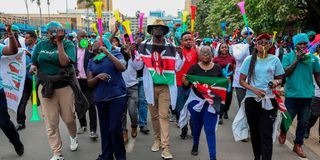
Universal Health Coverage medics protest along Harambe Avenue Nairobi on May 27, 2025 to demand better terms of employment.
Until then, if you pass by Dagoretti Corner and see a young man in a faded university hoodie selling vegetables, remember: behind that smile is a trained medic still waiting for his chance to serve.
Elizabeth Kajuju
I'm 36 years old, turning 37 years on the 18th of this month. I have a Bachelor's Degree in Nutrition and Dietetics from Kenyatta University, but I am unemployed and surviving by filling questionnaires for campus students. Despite all my parents' investment in my education, I have nothing to show for it.
I was born in Igembe South, Maua ward, Meru County, with a physical disability affecting my right arm. As a single mother from a hand-to-mouth family, I told myself I would work hard to lift us out of poverty through education.
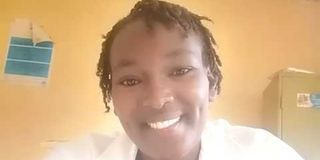
Elizabeth Kajuju Karuti (36) a trained dietician who has turned to filling questionnaires for campus students just to put food on the table.
My journey through KU wasn't easy. Due to financial challenges, I deferred multiple times, taking nine years to graduate instead of four. At one point, I dropped out completely and survived by doing data collection and filling questionnaires for university students—work that barely covered food, never mind school fees. Even today, this meager income keeps me afloat.
In 2020, fresh from graduation during the COVID-19 pandemic, the government deployed 8,571 of us as frontline health workers under the Universal Health Coverage (UHC) programme. We were the soldiers tasked with saving lives across all 47 counties.
As cases decreased, we hoped the government would improve our terms as appreciation for our service. We had accepted challenging conditions during deployment, prioritising lives over fair compensation.
An agreement was signed during the 'Kericho Declaration' promising our transition to permanent employment. However, we continue serving on contract terms with half salaries, no allowances, no increments, and full deductions.
Meanwhile, county governments continuously advertise health positions, deliberately excluding UHC staff like myself. The Council of Governors (CoG) demands our budgetary allocation while insisting we serve another two years at half pay, making it six years total under unfair conditions.
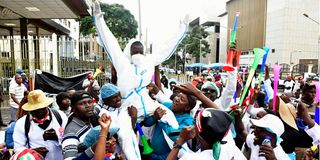
Universal Health Coverage (UHC) workers protest outside the National Treasury Building in Nairobi on May 27, 2025.
When we protested on March 20, 2024, the Ministry of Health told us CoG has been adamant about engaging in transition conversations. We don't understand why CoG refuses to give us fair terms despite our pandemic sacrifices.
We haven't received gratuities for our three-year term that ended in 2023, despite being gazetted in notice number 8091 dated October 12, 2020. The employer hasn't been remitting our NSSF deductions either.
The government has turned us into "full-time protesters" as we continue pushing for permanent and pensionable terms plus owed gratuities.
My disability means I can't do physical work. I've borrowed loans from a Sacco that I can't repay. The little I earn from filling questionnaires and data collection only covers monthly bills and my daughter's school fees, while straining my disabled hand.
I feel depressed because I can't get proper government employment or do manual work to support my family. As the firstborn and a mother, I'm responsible for four jobless siblings who've been home since 2021. I'm also supporting one sibling pursuing an IT degree.
Now I can't even pay my daughter's school fees.
I'm asking the Ministry of Health to employ UHC staff on permanent and pensionable terms and consider those of us with degrees for re-designation to appropriate job groups.
Being 36 years old with a degree, I hope to be recognised appropriately instead of being treated like a diploma holder. This would help me support my family and siblings who depend on me.

Universal Health Coverage (UHC) workers protests along Uhuru Highway in Nairobi on May 20, 2025.
We served our country during its darkest hour. Now we need our country to serve us with the dignity and fairness we deserve.
Collins Ouma
I'm 27 years old with a bachelor's degree in nursing from South Eastern Kenya University. Instead of caring for patients, I operate machines in a hair manufacturing plant in Industrial Area because the government won't give me an internship letter to practice nursing.
I was born in Nairobi but raised in Kisumu, Nyakach constituency. When I was 16, my grandmother told me about her sister who was a nurse but chose teaching instead. Our extended family was full of teachers, and she pushed me to be different. After KCSE, I chose nursing.
Seven years later, I'm still chasing that dream.

Collins Ouma (27), a trained nurse who makes women’s hair in Industrial area.
I graduated in February 2024, hoping for immediate internship placement. The COVID-19 pandemic had already delayed my studies, and I was eager to start my career. But luck wasn't on my side—I missed the placement.
Now I'm waiting for 2025 placements, but the Health Ministry hasn't even released the internship list. We're supposed to report by July 1st, yet there's complete silence from the ministry. The anxiety is overwhelming.
The communication we've received is devastating: only 1,000 slots are available for over 2,000 graduates. More than half of us will miss placement—a crisis created by the ministry's poor planning.
Missing last year's slot wasn't easy. I watched fellow colleagues go for their placements after struggling with the government over unpaid allowances. Meanwhile, I was stuck at home with an expensive degree and no license to practice.
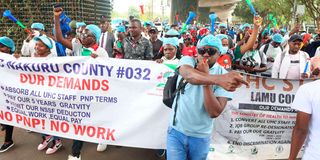
Universal Health Coverage (UHC) workers protests along Uhuru Highway in Nairobi on May 20, 2025.
Nursing school cost my family roughly Sh1.5 million. This wasn't easy money, relatives had to contribute, and I took a HELB loan of Sh180, 000. The financial and mental drain of nursing education is immense, making the current situation even more frustrating.
After graduation, I had nothing to do. Without a license, I couldn't work anywhere. So I turned to manual labor, construction sites — mjengo work. I never imagined waking up at 4am to do casual labor after spending years studying medicine.
I eventually gave up and returned to my village, completely demoralized. Then my mother called, she'd found a company recruiting workers for a hair manufacturing plant in Industrial Area.
I got the job by sheer luck with zero experience. It's visual and motor work involving hand manipulation. Six months later, I'm now a machine operator, which feels like an achievement given my circumstances. My colleagues have been supportive, and I'm grateful for that.
The job pays minimum wage, not much, but we survive while hoping for better. This detour wasn't planned, but it was necessary for survival.
My parents taught me they sent me to school to help myself and future children, not necessarily themselves. During this difficult time, they keep me in prayers and remind me these are life's challenges.
What I need, like 2,000 other pre-interns, is simple: internship placement and timely release of the internship list so we can get our licenses and move forward with our lives.
Nursing used to be a coveted career. Now the system works against degree nurses. There are limited slots in the job market, forcing many to seek opportunities abroad—which shouldn't be the case.
Worse still, there's no clear distinction between what degree, diploma, and certificate nurses should do. Even the nursing union isn't helping, they're part of the problem, not the solution.


